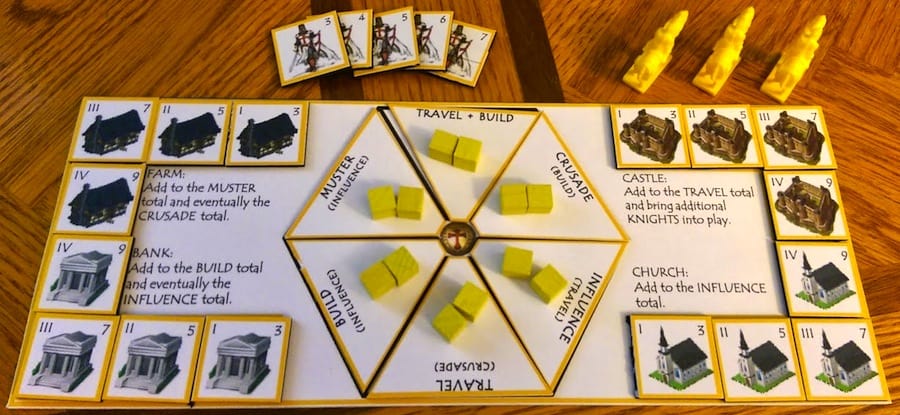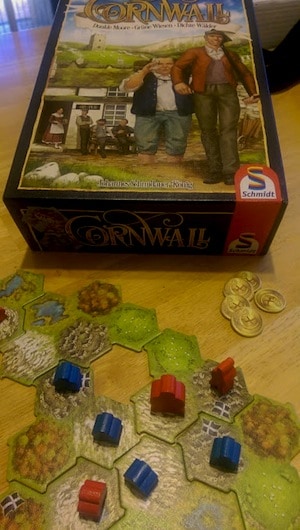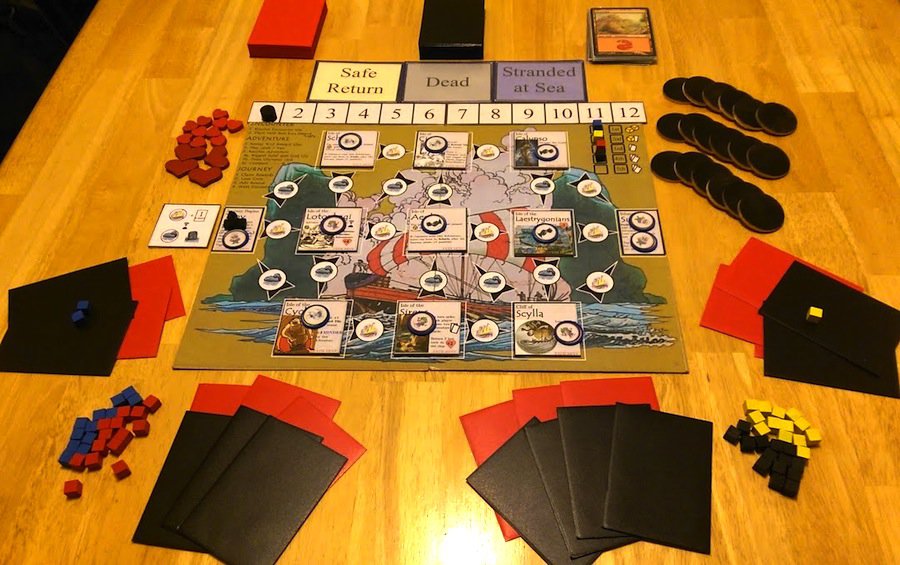
For several years I’d heard about Sasquatch, a small, invite-only convention in Seattle, but I never had the time to get up there for it. A couple of years ago I finally did make my way to the pacific northwest for the event, and boy am I glad I did! With several high school friends, a college friend, and a sister, niece, nephew, and brother-in-law in the area, I am able to get a lot of good visiting in whenever I am in Seattle. Also, Sasquatch is a convention where I don’t need to “work” at all – I don’t spend my time in a booth selling or demoing games, nor do I take pitches from designers. Instead, I get to relax for 5 days and let someone else teach me a game for once! And since Sasquatch comes right after Essen, I get to try out all the newest releases!
SASQUATCH IS A CONVENTION WHERE I DON’T NEED TO “WORK” AT ALL!
I’ve been attending Sasquatch for a couple of years now. Here’s a quick rundown of the games I played this year. Many of these games are 2015 releases!
GAMES PLAYED, AND IMPRESSIONS
Lignum :
A eurogame about lumber jacking… Advance as far as you want down a road each round to collect the workers and stuff you’ll need to cut and saw wood, but you can’t go backwards (like Egizia). It was alright, but seemed like a lot of work to get anything done. Nothing made me itch to play again.
Gold West :
A recent TMG release about mining for precious metals in the old west. Mancala mechanism and Euro-style scoring made for a really fun and interesting game, if you’re into that kind of thing (which I totally am). Gold West is a really good game.
Porta Nigra :
A game about building towers Spain or somewhere. Neat Euro style game, I enjoyed it. I’d play again, but I don’t foresee it being a classic that I return to often.
Exoplanets :
A game about creating new life and new species on planets. I played this at Essen and didn’t care for it. Subbed in for a player tonight and still didn’t care for it, though I managed to win 55-46-39-35. Each turn you draw a planet tile and place it into one of 4 spots, taking the face down scoring goal tile from that spot. Then you collect a couple of resources based on icons on that tile and the adjacent one. Finally, you may spend those resources to place Life cubes onto various planets. If you get up to 4, then you get your cubes back and replace them with a Species marker – reserving that planet for you and maximizing your score for it. The scoring goal tiles reward you for creating life and species on particular types of planets or in particular orbits, or you can discard them for various effects. One problem is that the scoring goals are totally random. We came up with several ways to improve the game, but there’s no real reason to do so – just play something else. If I ever play again, I’ll put the next scoring goal in each direction face up, I think that would at least help.
Crusaders: Thy Will Be Done :

My prototype about the Knights Templar… this game continues to be awesome, and the players liked it pretty well. In this game you move your knights around Europe, crusading against enemies, erecting buildings, and spreading the influence of your order. When the orders become too influential (i.e. the VP pool runs out), then King Philip disbands the orders, the game is over, and the player with the most influence wins. The action is driven by a personal moncala-rondel, sort of the opposite of Trajan’s… you choose an action to do each turn, and the more pieces in that actions bin the better. Then you mancala those pieces around your rondel, so you must build up that action before you can do it again.
Raptor :
A 2p game where 1 player tries to escape velociraptors from the board, while the other tries to capture them. First of all, I was really bad at that game – I survived ZERO raptors in either of the games I played. Turns out raptors don’t learn like they do in the movies…
You play cards simultaneously, and the lower value card gets the card effect, while the higher valued card gets action points equal to the difference, so like if you play a 5 and I play an 8, you get the effect of your 5 card, and I get 3 action points. You spend action points to move your dinos/scientists and stuff. You always had a hand of 3 cards, and I felt like often times I just couldn’t do what I wanted to do (to be fair, I don’t much like simultaneous action).
However, I found out later that I had played with a significant rule wrong! The game is clearly better with the correct rule… but still not my favorite type of game though.
Antarctica :
A game about abstract euro-style tech tracking and area control with an interesting turn order mechanism which is at once pretty cool, and one of the game’s biggest downfalls. I’ll just say that you end up doing a lot of sitting around waiting for your turn to come up. The scoring was kinda byzantine and awkward as well, and there were some other issues we had… it’s too bad because there were some really interesting ideas in there, but ultimately – ironically – Antarctica wasn’t that cool.
Riders of the Pony Express :
My prototype game about delivering parcels in the old west as a rider for the Pony Express. The game went fine, but there was 1 major issue that I need to address. I got some feedback about a few aspects of the game, and for the next test I have some interesting things to try.
Isle of Skye :
A game of I-Split-You-Choose with a solidly euro theme (i.e. dry and sterile). I liked the game, it had a lot of things going for it. I’d totally play again, but I wish it had a more fun theme! I think I might be uppity about that lately, I feel the same way about Cornwall for example. Isle of Sky might be my favorite new release.
Rabbit Hunt :
Surprisingly nice 2-4 player game of bluff and memory. You have bunnies that are yours, and you’re trying to catch your opponents’ bunnies while keeping your own safe. Very cute, and surprisingly fun!
Cornwall :

Or as I call it, Carcassonwall… Cornwall is similar to Carcassonne, but I think it’s a step up. It’s at once simpler (smoother, no Farmer scoring), and more complicated (a thin veil of economy). Like Carcasonne, you place a tile each turn, then you can place meeples onto it. Unlike Carc, it costs coins to get into an area where meeples already exist, or to place more than 1 meeple in a turn. You get coins by expanding multiple areas when you place. This is lighter than the games I like to play, but I do enjoy it and am happy to have it at home for when I might want something light and quick (like Carc).
Karuba :
I am really impressed with both of the HABA “Big Kids” games, but I think I like Karuba best of the two. In Karuba, you play paths onto the board in order to move your explorers to their respective temples. Like Take It Easy or Cities, every player has the same set of tiles – one player draws them randomly while all other players find that same tile to play. You can either play the tile onto your board, or you can discard it to move an explorer. The game is very well done, and the starting setup of the board has a bigger impact on gameplay than I thought it would.
Samara :
In Samara, you move along a calendar board as far a you’d like, to collect tools or build buildings. The farther ahead you move, the longer it’ll be before you get another turn. Once everyone in the current month has gone, the whole calendar board slides down until there are meeples in the ‘current’ space again.
Stamp Graffiti :
The description of this game sounded awesome, but playing it left something to be desired. You try to draw something using very restrictive drawing rules, and try to get someone to guess what it is… but some of the words are oddly specific (Lake Superior?) so it’s kinda ridiculous.
OctoDice :
I liked this “Aquasphere Express” sort of game. As dice games with a Yahtzee mechanism go, this one was pretty good. Starting with 6 dice(3 action dice and 3 color dice), you roll 3 times locking 2 dice each time. Then you use 2 pairs of Action-Color dice to do 2 actions, marking them on your score sheet. Once in a while you get to use an action rolled by an opponent, so you have a good chance of being able to do important actions.
Adventure Land :
Another HABA “Big Kids” game. Sorta like 504, there are multiple games in the box with the same basic rules… there are 3 adventures, and each one is a little more complicated and interactive than the last. In general, on your turn you move your adventurers as far as you want in one direction (but they can never go back), collecting swords, herbs, companions, and gold, and fighting monsters. Each adventure has its own scoring and goals. I only played the first 2 adventures, and I liked them, I think the 3rd would be even better.
The Big Book Of Madness :
A Solitaire By Committee style cooperative game with a sort of Harry Potter theme, you use colored cards to cast spells and stuff, adding cards to your deck gives the game a bit of a deck building feel which I thought was better done here than in some other games. But ultimately the game felt almost trivially easy (we played on medium difficulty), and I didn’t feel like we were in danger of losing ever. Maybe we’re just really good…
Monster-Falle :
I played this kids game with my niece and nephew. You play cooperatively with one of your opponents, like with La Boca, trying to move a monster through a sort of maze into a pit in the center of the board by pushing it with slats that go across the board. You control 1 side’s worth of slats (so 1 direction) and your opponent controls the other. You try and get as many successes as possible in the time allotted. It was pretty neat for a kid’s game.
Me Want Cookies :
Another kid’s game, this one was along the lines of Ghost Blitz. you have 3 cards in a display, each one with 6 dessert items (cookie, ice cream, cupcake, etc). The items are connected to each other by licorice. You roll a die which randomly determines your starting item, and from there you trace a path to the connected item on the first card. Then you take that output, and it becomes the input for the next card. Output from that is the input for the 3rd card. When you get the output from the 3rd card, you have to grab that item – first to grab it gets the point. There are 2 sets of cards, simpler ones, and more complicated ones with longer, more confusing licorice lines. Those harder ones were non-trivial, which made the game kinda fun even for adults.
Codenames :
The latest hotness in party games, I got in a few round of Codenames. One player on each team is a clue giver, the rest attempt to guess which words in a 25-word grid are being clued to, and the clue must only be 1 word. It’s like a suped up version of Password.
Odysseus: Winds of Fate :

Another of my prototypes, and I am pretty happy with the way this game has gone lately. In this game, Odysseus makes his epic journey from Troy to Ithaca. As one of the fates, you don’t necessarily care what happens to him, but to pass the time you will predict his destiny and the outcome of his adventures, and you’ll use your influence with the gods to try and make your predictions come true.
One cool thing about events like this are the meta-games you can’t play at home. For example:
Game Shows :
I missed them, but there was a game show style Codenames event which I know people had a lit of fun with, as well as a Family Feud style game show.
Halloween Game Thing :
Jesse McGatha made an awesome pseudo-puzzle game thing using rhyming/misheard words, anagrams, synonyms, and other wordplay. I thoroughly enjoyed it and I thought the participants all did a fantastic job making it come to life!
Have you played any of these games? What were your impressions? Post in the comments below!






